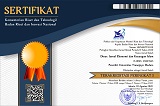The Effect of Income with Household Consumption on The Welfare of Dodol Potato Businesses Assessed From Islamic Economic Concept
Abstract
The purposed of this study was to analyze the influence between income and household consumption on the welfare of potatoes taffy business in Lubuk Nagodang Village, Siulak Subdistrict, Kerinci regency. This study was assessing the welfare of taffy business in Islamic economic concepts and indicators. Field research with quantitative-qualitative (Mixed Method) as the method and approach used in this research. The research data was sourced from primary data, using multiple linear regression equations as a data analysis tool. This study was shown that the income partially has a significant effect on the welfare of potatoes taffy business that assessed from the Islamic economic concept. Then, household consumption partially has a significant effect on the welfare of potatoes taffy business assessed from the concept of Islamic economics. Besides, the income with household consumption simultaneously has a significant effect on the welfare of potatoes taffy business assessed from the concept of Islamic economics with a significance value of 0.000 <0.05, and both variables contribute 69.2% together, while the remaining 30 ,8% influenced or explained by other factors not discussed in this study.
Keywords
Full Text:
PDFReferences
P3EI,. (2015). Ekonomi Islam. Raja Grafindo.
Al-Ghazali, I. (n.d.). Mizan al-Amal bab Ghayat al-Sa’adah wa Maratibuha. Dar al-Kutub.
Badan Pusat Statistik (BPS). (n.d.-a). Badan Pusat Statistik. Retrieved June 29, 2021, from https://www.bps.go.id/
Badan Pusat Statistik (BPS). (n.d.-b). Kabupaten Kerinci Dalam Angka 2018. Retrieved June 29, 2021, from https://kerincikab.bps.go.id/publication/2018/08/16/431cfdc3c20d72464c114b18/kabupaten-kerinci-dalam-angka-2018.html
Badawi, A. Z. (1982). Mu’jam Mushtalahatu al-U’lum al-Ijtimaiyyah. Maktabah Lubnan.
Dokumentasi Desa Lubuk Nagodang. (n.d.). Tingkat Perkembangan Desa dan Kelurahan 2015-2020.
Dumairy. (1996). Perekonomian Indonesia. Erlangga.
Furqani, H. (2017). Consumption and Morality: Principles and Behavioral Framework in Islamic Economics. JKAU: Islamic Economics, 30(Special Issue), 89–102. https://doi.org/10.4197 / Islec. 30-SI.6
Iskandar. (2008). Metode Penelitian Pendidikan Dan Sosial (Kuantitatif & Kualitatif. Gaung Persada.
Khan, M. A. (1994). An Introduction to Islamic Economics. International Institute of Islamic Thought and Institute of Policy Studies.
Nawawi, I. (2013). Isu-Isu Ekonomi Islam: Kompilasi Pemikiran Filsafat dan Teori Menuju Praktik di Tengah Arus Ekonomi Global. VIV Press.
Nelson, R. R., & Consoli, D. (2010). An evolutionary theory of household consumption behavior. Journal of Evolutionary Economics, 20(5), 665–687. https://doi.org/10.1007/s00191-010-0171-7
Nicklaus, C. (2015). The effect of household income on household consumption in China Christoph Nicklaus (Issue June 2015) [Lund Unversity]. www.ehl.lu.se
Nurrohman, D. (2011). Memahami Dasar-Dasar Ekonomi Islam. Teras.
Paul Samuelson & Willian D Nordaus. (2004). Makro Ekonomi (Haris Munandar et al (ed.)). PT. Gelora Aksara Pratama.
Pigou, A. C. (1932). The Economic of Welfare. Mac Millan.
Pusparini, M. D. (2015). Konsep Kesejahteraan Dalam Ekonomi Islam. Islamic Economics Journal, 1(1), 45–59.
Rahim, A. (2013). Ekonomi Islam Prespektif Muhammad SAW. STAIN Jember Press.
Rahman, M. T., & Khan, H. T. A. (2013). The effectiveness of the microcredit programme in Bangladesh. Local Economy, 28(1), 85–98. https://doi.org/10.1177/0269094212466036
Septiana, A. (2015). Analisis Perilaku Konsumsi Dalam Islam. Dinar: Jurnal Ekonomi & Keuangan Islam, 1 (2), 1-17. https://doi.org/10.21107/dinar.v2i1.2688
Sugiyono. (2014). Statiska Untuk Penelitian. Alfabeta.
Sugiyono. (2017). Metode Penelitian Bisnis. Alfabeta Bandung.
Sujarweni, V. W. (2015). Statiska Untuk Bisnis dan Ekonomi. Pustaka Baru Press.
Sukirno, S. (2000). Mikro Ekonomi Modern: Perkembangan Pemikiran dari Klasik Sampai Keynesian Baru. Raja Grafindo.
Sukirno, S. (2005). Mikro Ekonomi Teori Pengantar. Rajagrafindo Persada
Susanto, B. P. & A. S. Manara. (2017). Sistem Ekonomi Islam: Keseimbangan Dalam Pembangunan dan Kesejahteraan Umat. Dinar: Jurnal Ekonomi & Keuangan Islam, 4 (1), 1-23. https://doi.org/10.21107/dinar.v4i1.5065
Syathori, A. (2016). Konsep Welfare-Economic: Antara Etika Bisnis Islam Dan Protestan. RISALAH; Jurnal Pendidikan Dan Studi Islam, 1(1), 78–93.
Tika, M. P. (2006). Metodologi Riset Bisnis. Bumi Aksara.
Todaro, M. P. & S. C. S. (2006). Economic Development (11th Editi). Pearson Addison Wesley.
Undang-Undang Republik Indonesia Nomor 11 Tahun 2009 Tentang Kesejahteraan Sosial.
Wagle, U. R. (2007). Poverty in Kathmandu: What do subjective and objective economic welfare concepts suggest? J Econ Inequal, 5, 73–95. https://doi.org/10.1007/s10888-006-9026-8
Yusuf, A. M. (2005). Metodologi Penelitian: Dasar-Dasar Penyelidikan Ilmiah. UNP Press.
DOI: https://doi.org/10.21107/dinar.v7i2.11214
Refbacks
- There are currently no refbacks.
Copyright (c) 2020 Cendra Cendra, Muhammad Fauzi

This work is licensed under a Creative Commons Attribution-ShareAlike 4.0 International License.
Journal Dinar Indexed by:
Dinar: Jurnal Ekonomi dan Keuangan Islam by Universitas Trunojoyo Madura is licensed under a Creative Commons Attribution-ShareAlike 4.0 International License.






.png)










